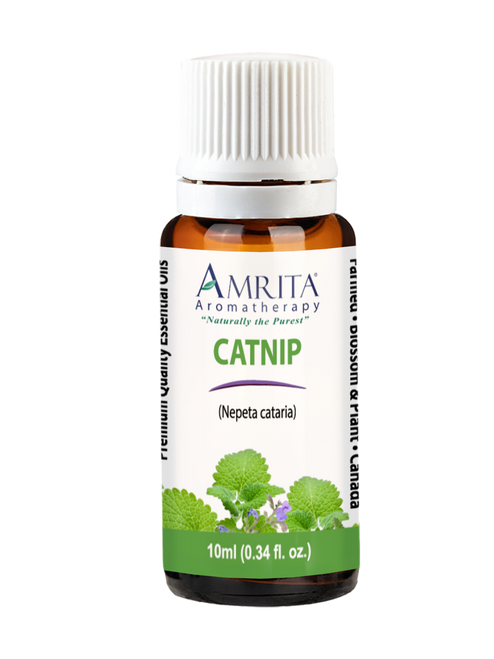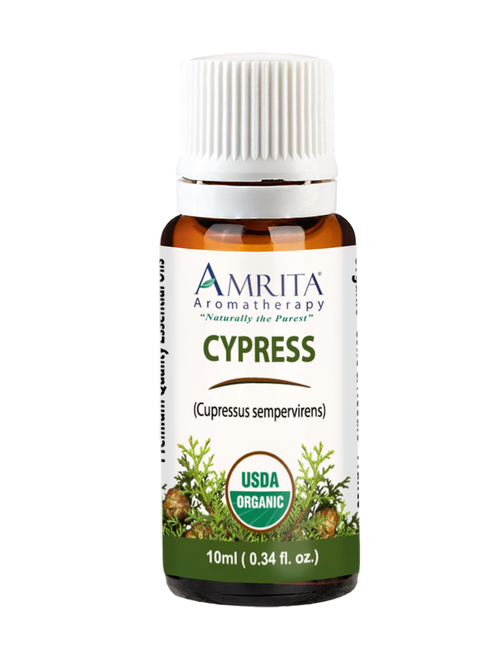- Other Names
- Catnep, Catswort, Catwort, and Catmint
- Farming Method
- Certified Organic
- Plant Part
- Blossom and Plant
- Country of Origin
- Canada
- Application Method
- Diffusion, Inhalation, and Topical
- Scientific Name
- Nepeta cataria
- Extraction Method
- Steam Distilled
About the Plant:
Catnip, Nepeta cataria, is a short-lived perennial, herbaceous plant that grows to be 20 – 40 inches tall and wide, and that blooms from late spring to autumn. In appearance, it resembles a typical member of the mint family of plants, featuring brown-green foliage with the characteristic square stem of the plant family Lamiaceae. The coarse-toothed leaves are triangular to elliptical in shape. The small, bilabiate flowers of Catnip are fragrant and are either pink in color or white with fine spots of pale purple.
Catnip is cultivated as an ornamental plant for use in gardens. It is also grown for its attractant qualities to house cats and butterflies. The plant is drought-tolerant and deer-resistant. It can be a repellent for certain insects, including aphids and squash bugs.* There are varieties of Catnip like Eucalyptus. Those include: Nepeta cataria var. citriodora, or "Lemon Catnip", named after its lemon-scented leaves.
Where It Grows:
Catnip is native to southern and eastern Europe, the Middle East, Central Asia, and parts of China. Today, it is widely naturalized in northern Europe, New Zealand, and North America.
Traditional Uses and Lore:
The names “Catnip” and “Catmint” are derived from the intense attraction about two-thirds of cats have toward it). In addition to its uses with cats, Catnip can be an ingredient in some herbal teas, and is valued for its sedative and relaxant properties.*
Nepeta cataria was one of the many species described by Linnaeus in 1753 in his landmark work Species Plantarum. He had previously described it in 1738 as Nepeta floribus interrupte spicatis pedunculatis (meaning 'Nepeta with flowers in a stalked, interrupted spike'), before the commencement of Linnaean taxonomy.
Nepetalactone is a mosquito and fly repellent.* Oil isolated from Catnip by steam distillation has large amount of nepetalactone, up to 70%, making it a repellent against insects, in particular mosquitoes, cockroaches, and termites.*
Catnip has a history of use in traditional medicine for a variety of ailments such as stomach cramps, indigestion, fevers, hives, and nervous conditions.* The plant has been consumed as a tisane, juice, tincture, infusion, or poultice, and has also been smoked.* However, its medicinal use has fallen out of favor with the development of modern medicine.* Catnip is also known for its calming, soothing effects and has been used to treat anxiety, insomnia, and stress-related conditions.* It can also help relieve digestive issues, such as gas and indigestion.* Surprisingly, Catnip was also used as a natural meat tenderizer!
Other Facts:
-
-
- Scent: Pungent, Herbaceous-Floral, and Minty Aroma
- Fragrance Note: Middle Note
- Composition: Nepetalactone I, Nepetalacatone II, Nepetalacatone III, ß-Caryophyllene, and ɑ-Humulene
- Family: Lamiaceae Family
-
*These statements have not been evaluated by the Food and Drug Administration. These products are not intended to diagnose, treat, cure, or prevent any disease.
- USDA Certified Organic
- Natural Insect Deterrent
- Supports Healthy Digestion
- Promotes Relaxing Atmosphere
Catnip Organic Essential Oil — the ultimate solution for summer annoyances. Wave goodbye to pesky buzzing with this powerful mosquito deterrent! With its unique blend of nepetalactones, Catnip Essential Oil is highly effective in keeping those pesky insects at bay.* But it's not just about keeping bugs away — this essential oil offers so much more.
Experience the refreshing aroma of Catnip, with its herbaceous scent and subtle hints of floral and mint. Say goodbye to sleepless nights caused by anxiety or life's challenges.* Simply blend Catnip with Lavender, Sweet Marjoram, Rose Geranium, or Lemongrass to enjoy a peaceful and restful sleep.*
Not only does Catnip Essential Oil help with relaxation, but it also offers relief for tense muscles and headaches.* Need a remedy for gas pain? Look no further — Catnip Essential Oil has got you covered.*
Please note: although the name might suggest otherwise, Catnip Essential Oil is not suitable for use with cats. It is highly concentrated and not safe for our feline friends, unlike the dried herb.
Topical Application (for use on the skin):
- Overal Topical Application: Dilute up to 1% in any carrier oil (5 drops per tablespoon of carrier oil) for the following and apply to affected areas:
- Nervous System:
-
- Encourage Motivation from Anxiety
- Calms and Relaxes the Mind
- Promotes Restful Sleep
- Digestive System:
-
- Relieves Symptoms of Indigestion
- Lessens Flatulence (Gas)
- Decreases Discomfort and Bloating
- Musculoskeletal System:
-
- Relaxes Muscle Spasms
- Eases Pain Relief
- Insect Deterrent
Diffusion / Inhalation Application (add a few drops to a nebulizer or nasal inhaler):
|
|
-------------------------------------------------------------------------------------------------------------------------------------------------------------------
Blends Well With:
-------------------------------------------------------------------------------------------------------------------------------------------------------------------
Safety Precautions:
- Catnip Essential Oil can be mild sensitizing.* It can be psychotropic if used incorrectly.*
- Some individuals may be allergic and could experience itching, redness, or swelling after contact with this oil.*
- Avoid during pregnancy.* Not suitable for cats.
General Precautions:
- Use essential oils only in diluted form on the skin and never internally.
- Always be careful when using essential oils with children.
- Give them only low doses, or better, consult a qualified aromatherapy expert before using.
- Also, use essential oils with care and only under the proper guidance of an expert while pregnant or if you have liver damage, epilepsy, cancer, or other serious health problems.
*These statements have not been evaluated by the Food and Drug Administration. These products are not intended to diagnose, treat, cure, or prevent any disease.
Catnip, a member of the Mint family, is most famous as a treat for cats to play with, but it also has a long history of traditional herbal use. Although the Catnip plant may be the feline drug of choice, the Catnip Oil has the opposite effect on mosquitoes. Studies have shown that nepelactones within Catnip are 10 times more effective at repelling mosquitoes as DEET. Catnip Essential Oil is widely used in bug repellent blends, as it can help deter mosquitos, bees, flies, fleas, and ticks…but that’s not all Catnip Essential Oil is good for!
Catnip Oil can encourage a relaxed state of mind in people, similar to the herb’s effects on cats.* Drinking Catnip Tea or using its essential oil in a diffuser or nebulizer may help reduce stress and anxiety.* Diffuse a combination of other essential oils with Catnip like Lemon or Grapefruit for a blend that invites comfort during difficult emotional transitions, and encourages motivation during times of anxiety, stress, and depression.* Catnip also has calming properties making it a useful and natural sleep aid.* Combine Lavender and Spearmint with Catnip to impart a subtle aroma and feeling of serenity by promoting a relaxing atmosphere.*
For centuries, the Catnip plant has been utilized to relieve discomfort caused by bloating, gas, and indigestion.* You can experience relief from bloating and constipation with this natural remedy in an essential oil variation.* Try massaging diluted Catnip Oil onto your abdomen in a clockwise motion to alleviate the discomfort and bid farewell to bloating, cramping, and indigestion!*
Catnip Oil is a natural remedy for muscle spasms and pain relief.* With its mild analgesic properties, this essential oil can help ease headaches, toothaches, and other minor discomforts.* Not only that, but Catnip Oil also boasts antibacterial, antifungal, and antiviral properties, making it a valuable addition to your wellness routine.* Enjoy its benefits through simple diffusion or by blending it into carrier oils for topical use on the skin.* Embrace the soothing effects of Catnip Oil and let it bring relief to your body and mind.*
The following is a list of conditions which Catnip Essential Oil addresses by category:
|
|
|
*These statements have not been evaluated by the Food and Drug Administration. These products are not intended to diagnose, treat, cure, or prevent any disease.
Bottles are filled by volume. Some bottle sizes may not be filled to the top, but do contain the volume of oil specified.
|
Click the links below to view GC Analysis:
|
Click the link below to view CoA Analysis:
|
|
Click the link below to view Safety Data Sheet (SDS): |









